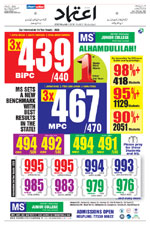Pakistan to ‘upgrade’ banned terror outfits to ‘high’ risk category, monitor their activities: Report
Sat 09 Mar 2019, 15:50:53

Islamabad: Pakistan has decided to ‘upgrade’ a group of banned terror outfits, including the Jaish-e-Mohammad (JeM), to a ‘high’ risk category and start monitoring and re-examining their activities to comply with the Financial Action Task Force (FATF) obligations, according to a media report on Saturday.
The Paris-based global watchdog against financial crimes had expressed dissatisfaction over considering these entities as ‘low’ to ‘medium’ risk by Islamabad, and said Pakistan did “not demonstrate a proper understanding of the terror financing risks posed by Daesh (ISIS), Al Qaeda, Jamaat-ud-Dawa(Jud), Falah-i-Insaniat Foundation (FIF), Lashkar-e-Taiba (LeT), Jaish-e-Mohammad (JeM) Haqqani network (HQN), and persons affiliated with the Taliban”.
The proscribed organisations will be examined under heightened security checks at all layers of legal, administrative, investigative and financial regimes, the Dawn newspaper reported.
At least 40 security personnel were killed when a suicide bomber of the Pakistan-based JeM attacked their convoy in Jammu and Kashmir’s Pulwama district on February 14.
“All these entities have now been described as high-risk entities and would be subject to greater scrutiny by all agencies and institutions of the state, starting from their registration to operations and from their fund collection to bank accounts and issuance of suspicious transactions, information sharing and so on,” an unnamed official was quoted as saying in the report.
He said these decisions were taken at a meeting of the general council on FATF, led by Finance Secretary Arif Ahmed Khan, as part of a series of meetings to comply with the FATF obligations. Khan had led the Pakistani delegation to Paris during the February 18-22 meetings of the FATF plenary and its group reviews. During the course of these meetings, Pakistan had banned the FIF and JuD on February 21.
The official said based on revised risk profile to “high” from “medium”, all the government institutions, including the Federal Investigation Agency (FIA), the Securities and Exchange Commission of Pakistan, the State Bank of Pakistan, the National Counter-Terrorism Authority, the Financial Monitoring Unit and intelligence agencies, would
separately review records, databanks and procedures and methodologies regarding the proscribed entities and their representatives.
separately review records, databanks and procedures and methodologies regarding the proscribed entities and their representatives.
Based on this review exercise and re-evaluation of risk indicators, fresh suspected transaction reports would originate and run through the banking sector, while law enforcement agencies would continue their ongoing tough actions against the banned entities, including confiscation of their assets and accounts, the official said.
“All these institutions would complete the exercise within two weeks so as to present a compliance report to a delegation of the Asia-Pacific Joint Group – a regional associate of the FATF – due to visit Islamabad on March 24.
“The delegation would review Pakistan’s performance on the basis of Islamabad’s fresh exercise over the next two days (March 25-26) and submit its assessment report to the FATF headquarters,” the report said.
The FATF would then make a fresh review the progress and compliance with the remaining targets by May by Pakistan and conclude in June review meetings, whether the country should be moved out of the “grey list” or kept in this list in case of minor shortcomings or be downgraded to the “black list” having serious financial and economic repercussions in case of serious shortcomings.
Pakistan has been placed on the grey list by the FATF for failing to curb anti-terror financing in June last year, despite Islamabad’s diplomatic efforts to avert the decision.
Officials said that defining these banned entities as high-risk meant the investigation agencies, supervisory and regulatory organisations and related institutions would be more alert and proactive to assessments of risk indicators, red flags, guidance and advisories.
They would be required to adopt the heightened level of inter-agency coordination for information sharing and actions to combat terror financing and money laundering, considered risk to global economy, the report said.
During the February 18-22 plenary and review meetings, the FATF had noted “limited progress” by Pakistan on targets set for January 2019, and urged the country “to swiftly complete its action plan, particularly those with timelines of May 2019.”
No Comments For This Post, Be first to write a Comment.
Most viewed from International
Most viewed from World
AIMIM News
Latest Urdu News
Most Viewed
May 26, 2020
Do you think Canada-India relations will improve under New PM Mark Carney?
Latest Videos View All
Like Us
Home
About Us
Advertise With Us
All Polls
Epaper Archives
Privacy Policy
Contact Us
Download Etemaad App
© 2025 Etemaad Daily News, All Rights Reserved.

.jpg)
.jpg)
.jpg)






.jpg)


.jpg)
.jpg)
.jpg)
.jpg)
.jpg)
.jpg)
.jpg)
.jpg)
.jpg)
.jpg)
.jpg)
.jpg)

















